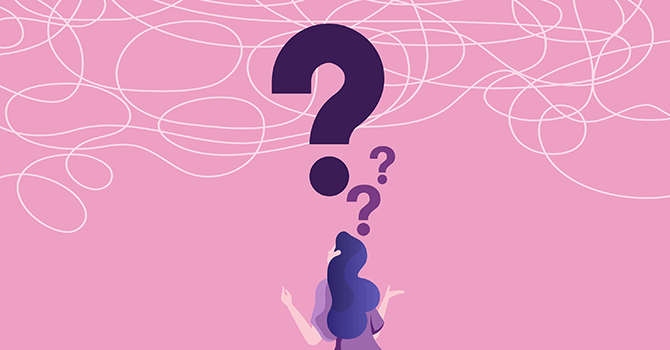I have to make a decision about school for my child in the fall. Virtual? In-person? Hybrid?
What is the right decision for my child and our family? What effect does my choice have on other children, on the teachers and staff, and on their families? How does my choice affect funding and resources? Is it better to keep my child at home to prevent the unknowing spread of germs to others -- or to send my child to school to show my trust in and solidarity with the public school system? How does my choice hinder or help the inequities already in a broken system?
Such questions contribute to what are known in design thinking as wicked problems. They do not have clear starting or ending points, they cross social and conceptual boundaries, and they require unconventional generative strategies.
Think about a knotted ball of yarn.
In attempts to unravel it, every time you pull on one string, a micro-knot tightens within it. A possible solution to one question can have positive and negative effects on other parts of the problem. We face a number of wicked problems every day: access to health care, systemic racism, poverty and economic injustice, and on and on.
A wicked problem feels overwhelming. Thinking about it makes us want to throw up our hands and narrow our field of vision, believing that the ripples from our choices are so small that they could not possibly have a meaningful effect on anyone else. We have other things to think about and need to make a decision and move on. We hunker down and do what is best for ourselves and those closest to us. We do what we have to do to make the overwhelmed feeling go away.
Feeling overwhelmed is a normal, natural, valid response right now. At the same time, we have control over which feelings we allow to take up the majority of space in our world. We can choose to explore other feelings, particularly those that consider others.
What if we choose empathy? What if we choose one person affected by the wicked problem and consider the ways that person experiences our decision? A student. The principal. A teacher. A lunchroom attendant. A special education aide. What does that person’s average day look like as a result of our choice? Does the person have a voice? A place? A job? Is the person endangered? Valued? Afraid?
What if we choose curiosity? We all have our small group of dependable friends who look, live, think, vote and make decisions as we do. These comfortable “echo chambers” tell us what we want to hear and build our confidence in “path dependence,” or the shaping force of history, which isn’t always healthy or helpful.
But do we know people who would likely make a different decision? What are their motivations and reasons? What constraints or privileges inform their choice? What questions are they asking? Where do they get their information? What might we learn from them?
What if we borrow a tool from the Ignatian Election? Make a tentative decision and live with it for a day. Go about your routine acting as if you have committed to that decision. How do you feel? How does it affect those around you? What do you feel you gain or lose having made the decision? Most importantly, how do you sense God working through this decision?
The next day, make a different decision and ask yourself the same questions. Which choice sits better with you, those around you and those affected by it? Where is God at work in this decision?
A critical casualty of the pandemic is social isolation, whether mandated or optional. When we live in isolation, our world, our view and our values can get smaller and more inward focused. It becomes easier to make decisions based only on the people and context we see immediately in front of us. We neglect to remember the bigger picture of neighbors and community.
Wicked problems have always been among us. The pandemic and conversations around toxic systems and structures have exacerbated them. Feeling overwhelmed is valid and normal. It is also a signal that we are taking problems seriously. Instincts tell us to protect ourselves.
Life in Christian community invites us to an alternative path. What does it look like to love God and love our neighbor in the midst of wicked problems? What does it look like to love our neighbor as ourselves when a wicked problem has us feeling overwhelmed?
The answers can be as different as the questions asked and the neighbors asking them. The most generative and just solutions to wicked problems will come once we validate and move past feeling overwhelmed and move toward more other-centric and open-minded feelings, like empathy and curiosity.














